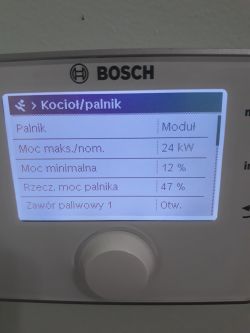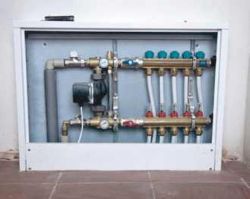rustin wrote: I wonder what the power limit in the boiler is.
This is an individual matter.
If someone has, for example, a domestic hot water tank whose coil has a lower power than the maximum power of the boiler, this power should be adjusted to the power of the coil. If necessary, we lower the maximum power.
In this case, limiting the maximum power may affect the boiler`s operating characteristics.
If someone has an ON/OFF room regulator, the regulator does not communicate with the boiler and does not control its power, but only gives a heating signal or turns it off, and the heating process is carried out according to the algorithm that is installed in the built-in electronics that controls the operation of the boiler.
Currently, boilers have a set start power, i.e. the boiler can start with a defined power but then goes to maximum power and starts modulating if necessary.
Too high a maximum power may result in the burner not heating smoothly, but sometimes it will heat more strongly, and in a moment it will reduce the power and there will be a sine wave in the boiler`s heating power.
In my opinion, there is no point in setting the maximum for more than the power needed for frost -20, but ultimately, everyone sets the boiler according to their own needs.
The practice is that most people leave it as set by the installer and do not change anything because they are afraid and do not know what to set and how to set it.
And in my opinion, each case should be considered individually, because the maximum power is one thing, but the minimum power of the boiler is important.
Anyway, everyone has a different sense of what is good and what is bad.
For example, I was at home where the radiators were clearly humming, which indicated that the pump capacity was too high, but the owner claimed that it was OK and saw no need to change anything. I would immediately change the settings and look for the optimal settings, while someone else doesn`t care and doesn`t care.
Added after 24 [minutes]: Wojewoda82 wrote: c) boiler efficiency is best at minimum power, the closer to maximum power, the lower the efficiency - for some time after firing, a throttled boiler operates with better efficiency than if it were running at 100%.
I would argue a bit here.
Apparently, boilers have the highest efficiency at 100% power, but in the case of condensate, there is additional efficiency resulting from condensation, which gives the marketing efficiency above 100%.
And a boiler operating at 100% capacity would eventually reach the boiler water temperature where condensation no longer occurs, so the overall efficiency of the condensing boiler ultimately decreases because we lose several percent of efficiency due to the lack of condensation.
In other words, even if the boiler operates at partial power with lower efficiency, it gains an additional percentage of efficiency from the condensation effect, so in the end we gain more than we lose due to the lower power, which means the global balance is positive.




